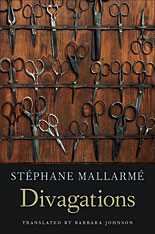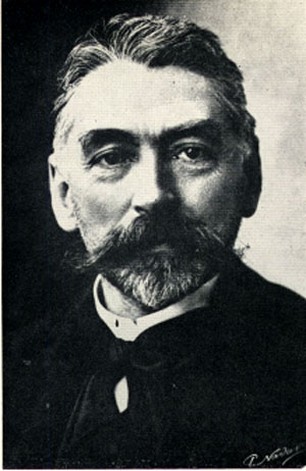Divagations by Stephane Mallarme. Cambridge. 2007. Harvard University Press. hardcover. 302 pages. Jacket photograph: Kamil Vojmar. Jacket design by Annamarie McMahon Why. Translated from the French by Barbara Johnson. 9780674024380.
 FROM THE PUBLISHER -
FROM THE PUBLISHER -

‘This is a book just the way I don’t like them,’ the father of French Symbolism, Stéphane Mallarmé, informs the reader in his preface to Divagations: ‘scattered and with no architecture.’ On the heels of this caveat, Mallarmé’s diverting, discursive, and gorgeously disordered 1897 masterpiece tumbles forth—and proves itself to be just the sort of book his readers like most. The salmagundi of prose poems, prose-poetic musings, criticism, and reflections that is Divagations has long been considered a treasure trove by students of aesthetics and modern poetry. If Mallarmé captured the tone and very feel of fin-de-siècle Paris, he went on to captivate the minds of the greatest writers of the twentieth century—from Valéry and Eliot to Paul de Man and Jacques Derrida. This was the only book of prose he published in his lifetime and, in a new translation by Barbara Johnson, is now available for the first time in English as Mallarmé arranged it. The result is an entrancing work through which a notoriously difficult-to-translate voice shines in all of its languor and musicality. Whether contemplating the poetry of Tennyson, the possibilities of language, a masturbating priest, or the transporting power of dance, Mallarmé remains a fascinating companion—charming, opinionated, and pedantic by turns. As an expression of the Symbolist movement and as a contribution to literary studies, Divagations is vitally important. But it is also, in Johnson’s masterful translation, endlessly mesmerizing.
 Stéphane Mallarmé was the son of Numa Mallarmé, a civil servant, and Elisabeth Desmolins. Mallarmé did not follow his father's or grandfather's path of civil servitude, instead excelling at languages and writing often, influenced by poets Victor Hugo and Charles Baudelaire. Mallarmé received his baccalaureate in 1860 and went on to publish his first poem ‘Placet’ in the French magazine Le Papillon in 1862. He pursued further studies in London to improve his knowledge of English. In 1863, he married German governess Christina ‘Maria’ Gerhard and obtained his certificate for teaching English. He and Maria traveled to Tournon where he taught in a provincial secondary school. In 1864, Maria gave birth to their daughter, Genevieve. Mallarmé's teaching career took him to Besancon, Avignon, and back to Paris again until he retired in 1893. One of Mallarmé's most well-known poems, L'Aprés Midi D'un Faun (The Afternoon of a Faun) (1865), inspired Debussy's tone poem (1894) of the same name and was illustrated by Edouard Manet. Among his other works are Hérodiade (1896) and Toast Funèbre (A Funeral Toast), which was written in memory of the author Théopile Gautier. Mallarmé's later works include the experimental poem Un Coup de Dés (1914), published posthumously. Besides his own writings, Mallarmé was well-known for his Tuesday evening salons at his home on the Rue de Rome in Paris. These gatherings were a hub of Parisian intellectual life and attracted the likes of writers André Gide, Paul Valéry, Oscar Wilde, Paul Verlaine, Rainer Maria Rilke, and W.B. Yeats, the painters Renoir, Monet, Degas, Redon, and Whistler, and the sculptor Rodin, among others. Those who attended became known as Les Mardistes, derived from the French word for Tuesday. In the 1880s, Mallarmé was at the center of a group of French writers including Andre Gide, Paul Valéry and Marcel Proust. Mallarmé referred to their group as The Decadents, a comment on their bohemian lifestyles. He and Valéry, following Baudelaire, would later become known as two of the leaders of the Symbolist movement in poetry. While French poetry had traditionally held fairly strict conventions of rhyme, meter and theme, Mallarmé and his contemporaries departed from these traditions, employing condensed figures and unorthodox syntax. Mallarmé's work was often termed as difficult or obscure. His later works, including Un Coup de Des, explored the relationship between content and form, between the text and the arrangement of words and spaces on the page. Mallarmé died in Valvin, Vulaines-sur-Seine on September 9, 1898, before finishing what he called his ‘Grande Oeuvre.’
Stéphane Mallarmé was the son of Numa Mallarmé, a civil servant, and Elisabeth Desmolins. Mallarmé did not follow his father's or grandfather's path of civil servitude, instead excelling at languages and writing often, influenced by poets Victor Hugo and Charles Baudelaire. Mallarmé received his baccalaureate in 1860 and went on to publish his first poem ‘Placet’ in the French magazine Le Papillon in 1862. He pursued further studies in London to improve his knowledge of English. In 1863, he married German governess Christina ‘Maria’ Gerhard and obtained his certificate for teaching English. He and Maria traveled to Tournon where he taught in a provincial secondary school. In 1864, Maria gave birth to their daughter, Genevieve. Mallarmé's teaching career took him to Besancon, Avignon, and back to Paris again until he retired in 1893. One of Mallarmé's most well-known poems, L'Aprés Midi D'un Faun (The Afternoon of a Faun) (1865), inspired Debussy's tone poem (1894) of the same name and was illustrated by Edouard Manet. Among his other works are Hérodiade (1896) and Toast Funèbre (A Funeral Toast), which was written in memory of the author Théopile Gautier. Mallarmé's later works include the experimental poem Un Coup de Dés (1914), published posthumously. Besides his own writings, Mallarmé was well-known for his Tuesday evening salons at his home on the Rue de Rome in Paris. These gatherings were a hub of Parisian intellectual life and attracted the likes of writers André Gide, Paul Valéry, Oscar Wilde, Paul Verlaine, Rainer Maria Rilke, and W.B. Yeats, the painters Renoir, Monet, Degas, Redon, and Whistler, and the sculptor Rodin, among others. Those who attended became known as Les Mardistes, derived from the French word for Tuesday. In the 1880s, Mallarmé was at the center of a group of French writers including Andre Gide, Paul Valéry and Marcel Proust. Mallarmé referred to their group as The Decadents, a comment on their bohemian lifestyles. He and Valéry, following Baudelaire, would later become known as two of the leaders of the Symbolist movement in poetry. While French poetry had traditionally held fairly strict conventions of rhyme, meter and theme, Mallarmé and his contemporaries departed from these traditions, employing condensed figures and unorthodox syntax. Mallarmé's work was often termed as difficult or obscure. His later works, including Un Coup de Des, explored the relationship between content and form, between the text and the arrangement of words and spaces on the page. Mallarmé died in Valvin, Vulaines-sur-Seine on September 9, 1898, before finishing what he called his ‘Grande Oeuvre.’
Barbara Johnson taught in the departments of English and Comparative Literature at Harvard University and was the Frederic Wertham Professor of Law and Psychiatry in Society. She is the author of The Critical Difference, A World of Difference, and The Wake of Deconstruction.